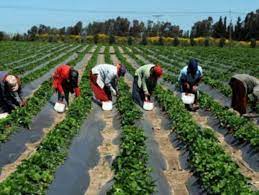APA – Dakar (Senegal) – A hackathon was held in Dakar on November 8 and 9, organized by the Accelerating Impacts of Climate Research for Africa (AICCRA) project of the Consultative Group on International Agricultural Research (CGIAR).
More than in other parts of the world, hunger is a sad reality in Africa. On this continent, where agriculture has not yet reached a standard level, post-harvest losses exacerbate the vulnerability of populations.
Noted between cultivation in the fields and consumption of the food, post-harvest losses have been identified by the Consultative Group on International Agricultural Research’s (CGIAR) Accelerating the Impact of Climate Research for Africa (AICCRA) project as “a major challenge at the heart of food security and socio-economic development.”
In Senegal, where agriculture accounts for 15.5 percent of national GDP and employs over 22 percent of the working population, the food and nutrition situation oscillates between phase 1 (minimal) and phase 2 (under pressure). However, according to the ‘Réseau de Prévention des Crises Alimentaires’ (Food Crisis Prevention Network, RPCA), several of its 14 regions could, without corrective measures, fall into phase 3 (crises).
This gloomy outlook is due in particular to post-harvest losses “reaching 12 percent to 40 percent in Senegal, and affecting the entire agricultural value chain. The sectors most affected are cereals, protein crops, horticulture and livestock (particularly the dairy sector). All in all, annual losses of nearly 100 billion CFA francs jeopardize the stability of food production and economic growth,” the CGIAR explains.
Various links in the post-harvest value chain were analyzed for selected crops (maize, rice, sorghum, millet, fonio, groundnuts, cowpeas, tomatoes, potatoes, mangoes, sweet potatoes), namely transport, storage, processing and distribution.
The situation analysis highlights constraints in the post-harvest chain of the crops studied, and characterizes the main challenges faced by food production stakeholders in Senegal, namely constraints related to handling, storage conditions, logistics and coordination in the food supply chain.
In West Africa as a whole, post-harvest losses are responsible for a “15 percent drop in income for farmers and other players in the value chain.” This is the backdrop to the hackathon organized in the Senegalese capital on November 8 and 9, 2023.
Science at the service of agriculture
The aim is to “promote a climate-resilient future through innovation” by facilitating “fruitful collaboration between various key players (agricultural producers, agri-food processors, agro-industrialists, academics, researchers…) with the aim of devising innovative and climate-resilient solutions, while taking gender into account.”
Panelist on the sidelines of the competition, Dr. Abdrahmane Wane, West Africa Representative of the International Livestock Research Institute (ILRI), recalled that, “in the 2014 Malabo Declaration, African heads of state had committed to halving the volume of post-harvest losses by 2025.” But “so far, only five countries out of the 54 on the continent have managed to produce conclusive data on the state of these losses and propose solutions,” pointed out Mr. Wane, an expert in animal production systems.
On a macro level, he explained, “there are post-harvest losses linked to structural problems such as the existence of roads in poor condition, the absence of large storage infrastructures, etc.”
Drawing lessons from the recent onion shortage in Senegal, which led to soaring market prices, Dr. Abdrahmane Wane invited “the State and the private sector to invest” more in storage infrastructures. For, assured ILRI’s regional representative, “storage sites would have made it possible to manage production and list market parameters (price, volume, etc.) so as to avoid the price rises observed” for onions during this period.
At the micro level, Mr. Wane suggested that “on rural farms, innovative solutions, perceived as technology or changes in practices, organizations… can be found to enable growers to suffer fewer post-harvest losses.”
In addition to the hackathon, four panels on the themes of “the gender perspective in the development of agricultural projects,” “value chain structuring as a strategic means of combating post-harvest losses,” “the use of data and digital as a lever for innovation to reduce post-harvest losses” and “support and funding for agricultural innovation” punctuated the two days of reflection organized by the CGIAR.
ID/ac/fss/abj/APA


